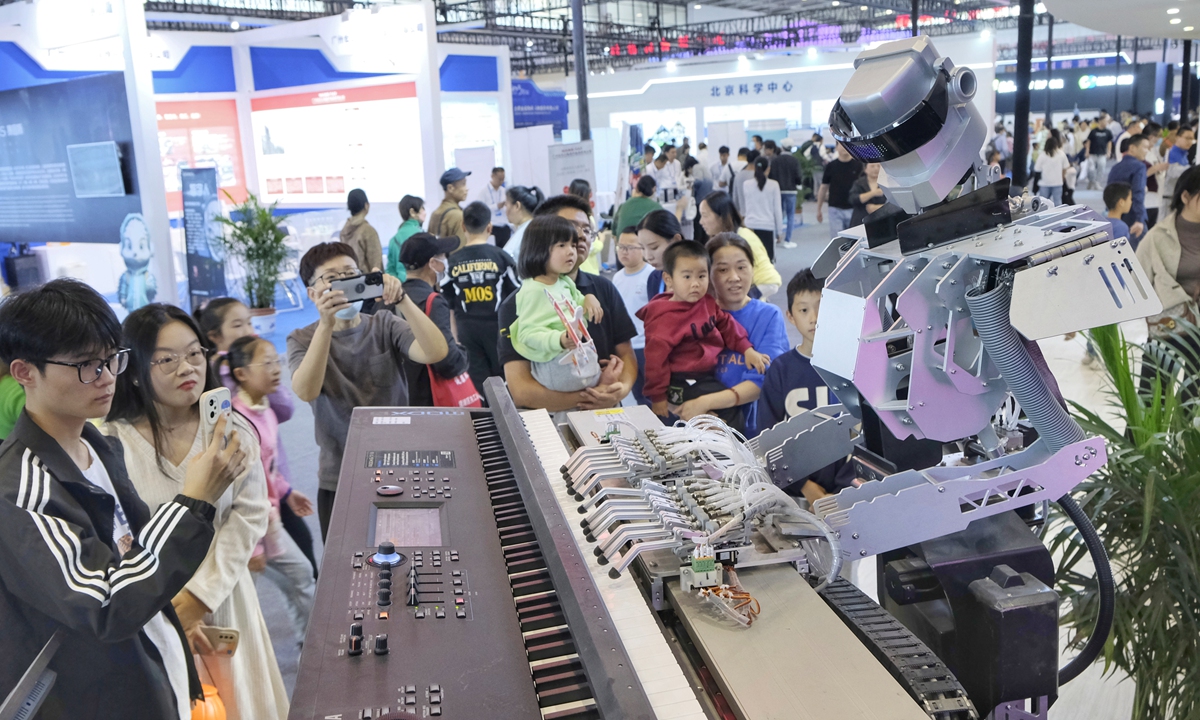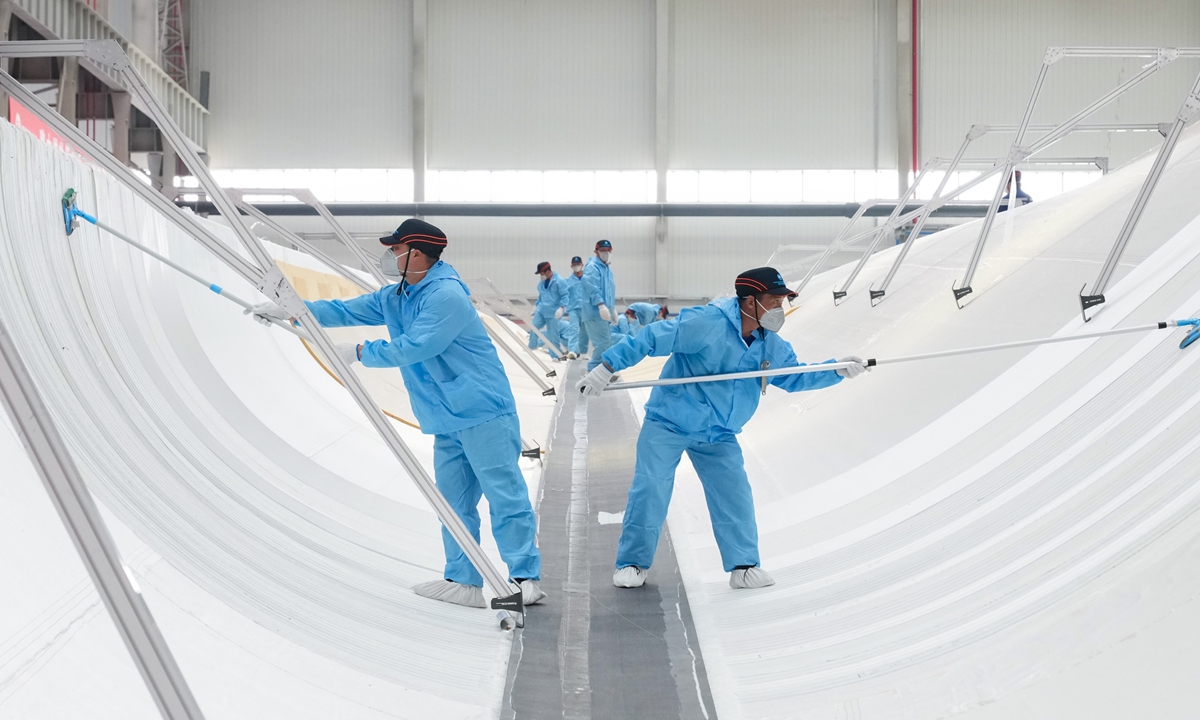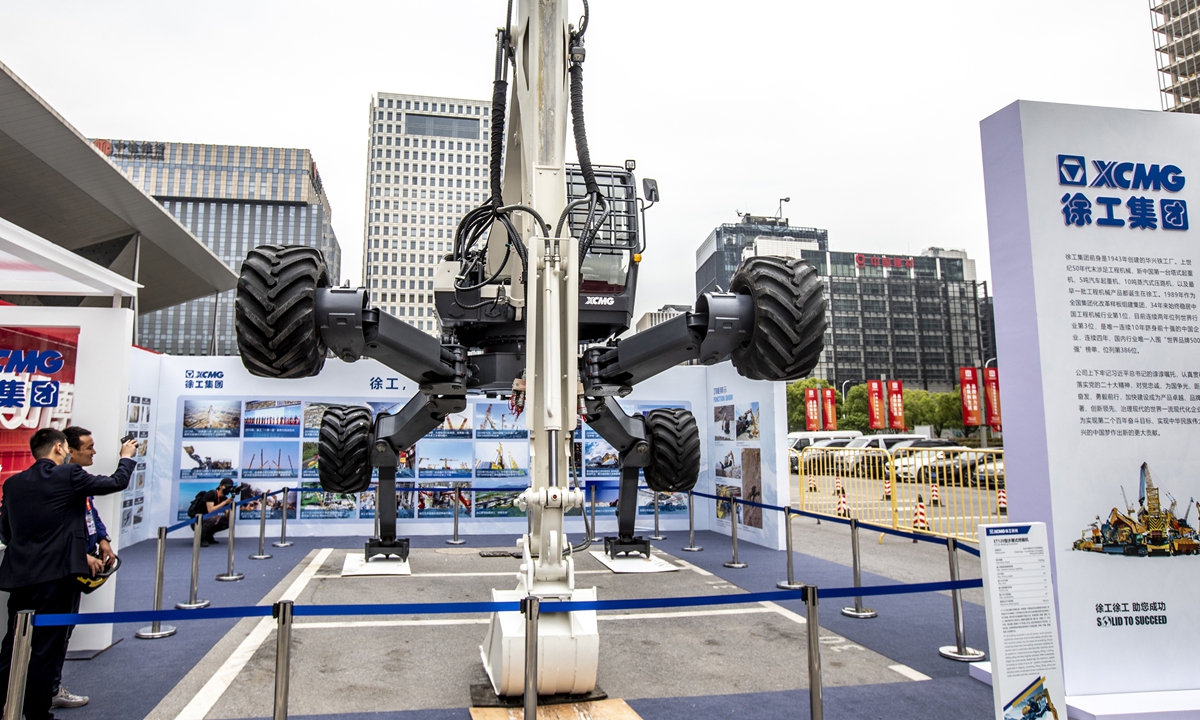Xiconomics in Practice: Xi puts new quality productive forces at front and center in China’s economic agenda
New quality productive forces
Editor's Note:
Since 2012, China has witnessed an extraordinary economic transition, with historic achievements in all aspects of the economy from its size to quality. Such an unparalleled feat does not just happen, especially during a tumultuous period in the global geo-economic landscape and a tough phase in China's economic transformation and upgrading process. It was Xi Jinping Thought on Socialism with Chinese Characteristics for a New Era that guided the country in overcoming various risks and challenges, and in keeping the China economic miracle alive.
As China embarked on the quest to become a great modern socialist country amid global changes unseen in a century, Xi's economic thought has been and will continue to be the guiding principle for development in China for years to come, and have great significance for the world. What is Xi's economic thought? What does it mean for China and the world?
To answer these questions, the Global Times has launched this special coverage on Xi's major economic speeches and policies, and how they are put into practice to boost development in China and around the world.

This year's two sessions - China's annual legislative and political consultative sessions - officially concluded on Monday, after national lawmakers and political advisers spent a week or so, on mapping the country's social and economic development blueprint for 2024 and beyond.
Often described as one of the most important political events, the two sessions, during which a slew of development goals are determined, offer a critical window for the world to view the latest economic trends and policy priorities in the world's second-largest economy.
More importantly, Chinese President Xi Jinping's agenda and major speeches during the two sessions provide the most crucial insights into the development path of the Chinese economy.
During this year's two sessions, Xi participated in three deliberations or group discussions with national lawmakers and political advisers, during which he also delivered important speeches. And a key theme emerged from these meetings and speeches: The Chinese top leader has put new quality productive forces front and center in China's economic agenda in 2024 and for many years to come.
As a relatively new concept that was first put forward by Xi during an inspection tour of Northeast China's Heilongjiang Province in September 2023, new quality productive forces has become a key phrase in China's political lexicon in recent months. Xi's emphasis on the phrase further highlighted its significance in China's economic policymaking and China's future development paths, as officials across the country have and will continue to roll out measures to boost innovation and generate new productive forces.
China's pursuit of new quality productive forces, which place the main focus on innovation and technological self-reliance, comes as China's economy faces a profound transformation from old growth drivers to sustainable ones, and as the global geo-economic situation has grown increasingly complex - characterized by the US' relentless technological crackdowns and growing protectionism. Therefore, developing new quality productive forces is critical for China's sustainable, high-quality development, Chinese lawmakers, political advisers, and economists said.
Top leader's focus at two sessions
During each year's two sessions, Xi often visits and holds meetings with national lawmakers and political advisors, and delivers major speeches on key national issues. This year, the Chinese president made three such visits, in line with the number made during the two sessions in 2023.
On the afternoon of March 5, Xi participated in a deliberation with fellow lawmakers from East China's Jiangsu Province during the second session of the 14th National People's Congress (NPC), China's national legislature.
Xi called for focusing on high-quality development as a top priority, urging efforts to step up innovation, foster emerging industries, adopt forward-thinking plans to develop future-oriented industries, and improve the modernized industrial system. He stressed the development of new quality productive forces according to local conditions, according to the Xinhua News Agency.
The top leader also made remarks about developing new quality productive forces or related issues such as technological innovation at the other two such deliberations he participated in.
On March 6, Xi participated in a joint group meeting during the second session of the 14th National Committee of the Chinese People's Political Consultative Conference (CPPCC), the top political advisory body. Xi called on political advisors and all people in the science and technology sector to strengthen basic research and apply basic research, strive to achieve breakthroughs in core technologies in key fields, and create new drivers to develop new quality productive forces.
Then on March 7, Xi attended a plenary meeting of the delegation of the People's Liberation Army and the People's Armed Police Force at the second session of the NPC. He stressed deepening reform to comprehensively enhance strategic capabilities in emerging areas. He also said that China's drive to accelerate the development of new quality productive forces has provided rare opportunities for the development of strategic capabilities in emerging areas.
The successive remarks about the new quality productive forces on three different occasions accentuated the top leader's focus on the issue and its importance in China's economic development, not just this year but in the years to come, national lawmakers, political advisers, and experts said. "The concept offers guidance for our country to take advantage of the historical opportunity of a new round of technological upgrade and aims to develop strategic emerging industries and future industries," Guo said.
Developing new quality productive forces is a decisive step in the economy's high-quality development course, Guo Guoping, an NPC deputy and a vice director of the Key Laboratory of Quantum Information of the Chinese Academy of Sciences, told the Global Times.
New quality productive forces refers to innovation-led, advanced productivity that is freed from traditional economic growth mode and productivity development paths, is high-tech, high efficiency and high quality, and is in line with the new development philosophy, Xi said during a group study session of the Political Bureau of the Communist Party of China (CPC) Central Committee in February, stressing that developing new quality productive forces is an endogenous requirement and a pivot of high-quality development.

From concept to action
Thanks to the top leader's focus, while the concept of new quality productive forces has only been around for a few months, it has been rising rapidly in China's political and social lexicon and has become a buzzword across the country. More importantly, it has already been put into action in China's economic policymaking.
The Central Economic Work Conference in December 2023, which set top economic policy priorities for 2024, also heightened the development of new quality productive forces. New quality productive forces also became the subject of the first group study session held by the Political Bureau of the CPC Central Committee this year, according to Xinhua.
This year's Government Work Report also highlighted efforts to develop new quality productive forces. According to the report, China will strive to modernize its industrial system and develop new quality productive forces at a faster pace. It also said that China will step up research on disruptive and frontier technologies, and will launch an AI Plus initiative.
The top leader's emphasis on new quality productive forces was echoed throughout the two sessions, where lawmakers and political advisers enthusiastically talked about the concept and vowed to make great efforts in developing new quality development.
Shan Zenghai, an NPC deputy and chief engineer of Chinese construction equipment giant Xuzhou Construction Machinery Group (XCMG), who participated in the deliberation of the Jiangsu delegation on March 5, said he was inspired by the top leader's remarks on new quality productive forces.
"The encouragement from top leadership greatly boosted our confidence in sticking to innovation-driven growth, bolstering the real economy and promoting high-quality development," Shan told the Global Times.
Zhou Bin, another NPC deputy from Yancheng, Jiangsu, who also attended the deliberation, told the Global Times that Xi's important remarks on new quality productive forces have offered scientific guidance for opening up new development tracks and shaping new development momentum.
Many officials vowed to take concrete actions to develop new quality development forces. Wu Qingwen, an NPC deputy and mayor of Suzhou, Jiangsu, said the city has the foundation, the condition, and the responsibility to take a lead in developing new quality productive forces, vowing to step up scientific and technological (sci-tech) innovation and bolster the city's high-end equipment, biomedicine, new energy industries among others, and create "new engines" such as artificial intelligence (AI).

When it comes to sci-tech innovation and the development of new growth drivers, China has already made great strides, thanks to the focus and support from the top leadership, national lawmakers, political advisers, and experts said.
Despite various challenges, including the US' relentless crackdown campaign, China has already become an innovation power. According to the World Intellectual Property Organization (WIPO) on Thursday, China remained the leader in international patent applications, followed by the US, Japan, South Korea, and Germany.
At the end of 2023, the number of high-value invention patents held on the Chinese mainland had exceeded 1.66 million, an increase of 25.7 percent year-on-year, and the number of effective high-value invention patents acquired in strategic emerging industries had reached 1.17 million, accounting for 70 percent of the total, according to Xinhua.
Also highlighting the steady progress in and importance of forming new growth drivers is the fact that the shift in China's three most popular exports. In the past, the three most popular items China exported were clothes, furniture, and home alliances, which were relatively low-value and labor-intensive; however, new-energy vehicles, solar batteries, and lithium-ion batteries have become China's tech-intensive and green "new three," with a combined export value of 1.06 trillion yuan ($150 billion) in 2023, jumping 29.9 percent year-on-year.
Moving forward, the development of new quality productive forces has great potential in China, as its huge marketplace ensures full testing, application, and evolution of new technologies and new business models, Xu Jiuping, a professor at Sichuan University and a member of the National Committee of the 14th CPPCC, told the Global Times, pointing to the support of national innovation policies.
Underscoring such policy support, the central government has pledged to allocate 370.8 billion yuan ($51.51 billion) for science and technology in 2024, an increase of 10 percent, with a focus on basic research, applied basic research, and national strategic tasks in science and technology, according to the budget adopted at the two sessions.
Since 2012, China has witnessed an extraordinary economic transition, with historic achievements in all aspects of the economy from its size to quality. Such an unparalleled feat does not just happen, especially during a tumultuous period in the global geo-economic landscape and a tough phase in China's economic transformation and upgrading process. It was Xi Jinping Thought on Socialism with Chinese Characteristics for a New Era that guided the country in overcoming various risks and challenges, and in keeping the China economic miracle alive.
As China embarked on the quest to become a great modern socialist country amid global changes unseen in a century, Xi's economic thought has been and will continue to be the guiding principle for development in China for years to come, and have great significance for the world. What is Xi's economic thought? What does it mean for China and the world?
To answer these questions, the Global Times has launched this special coverage on Xi's major economic speeches and policies, and how they are put into practice to boost development in China and around the world.

Visitors watch a robot playing the piano at the 11th China (Wuhu) Popularized Science Products Exposition held in East China's Wuhu, on October 22, 2023. Photo: VCG
This year's two sessions - China's annual legislative and political consultative sessions - officially concluded on Monday, after national lawmakers and political advisers spent a week or so, on mapping the country's social and economic development blueprint for 2024 and beyond.
Often described as one of the most important political events, the two sessions, during which a slew of development goals are determined, offer a critical window for the world to view the latest economic trends and policy priorities in the world's second-largest economy.
More importantly, Chinese President Xi Jinping's agenda and major speeches during the two sessions provide the most crucial insights into the development path of the Chinese economy.
During this year's two sessions, Xi participated in three deliberations or group discussions with national lawmakers and political advisers, during which he also delivered important speeches. And a key theme emerged from these meetings and speeches: The Chinese top leader has put new quality productive forces front and center in China's economic agenda in 2024 and for many years to come.
As a relatively new concept that was first put forward by Xi during an inspection tour of Northeast China's Heilongjiang Province in September 2023, new quality productive forces has become a key phrase in China's political lexicon in recent months. Xi's emphasis on the phrase further highlighted its significance in China's economic policymaking and China's future development paths, as officials across the country have and will continue to roll out measures to boost innovation and generate new productive forces.
China's pursuit of new quality productive forces, which place the main focus on innovation and technological self-reliance, comes as China's economy faces a profound transformation from old growth drivers to sustainable ones, and as the global geo-economic situation has grown increasingly complex - characterized by the US' relentless technological crackdowns and growing protectionism. Therefore, developing new quality productive forces is critical for China's sustainable, high-quality development, Chinese lawmakers, political advisers, and economists said.
Top leader's focus at two sessions
During each year's two sessions, Xi often visits and holds meetings with national lawmakers and political advisors, and delivers major speeches on key national issues. This year, the Chinese president made three such visits, in line with the number made during the two sessions in 2023.
On the afternoon of March 5, Xi participated in a deliberation with fellow lawmakers from East China's Jiangsu Province during the second session of the 14th National People's Congress (NPC), China's national legislature.
Xi called for focusing on high-quality development as a top priority, urging efforts to step up innovation, foster emerging industries, adopt forward-thinking plans to develop future-oriented industries, and improve the modernized industrial system. He stressed the development of new quality productive forces according to local conditions, according to the Xinhua News Agency.
The top leader also made remarks about developing new quality productive forces or related issues such as technological innovation at the other two such deliberations he participated in.
On March 6, Xi participated in a joint group meeting during the second session of the 14th National Committee of the Chinese People's Political Consultative Conference (CPPCC), the top political advisory body. Xi called on political advisors and all people in the science and technology sector to strengthen basic research and apply basic research, strive to achieve breakthroughs in core technologies in key fields, and create new drivers to develop new quality productive forces.
Then on March 7, Xi attended a plenary meeting of the delegation of the People's Liberation Army and the People's Armed Police Force at the second session of the NPC. He stressed deepening reform to comprehensively enhance strategic capabilities in emerging areas. He also said that China's drive to accelerate the development of new quality productive forces has provided rare opportunities for the development of strategic capabilities in emerging areas.
The successive remarks about the new quality productive forces on three different occasions accentuated the top leader's focus on the issue and its importance in China's economic development, not just this year but in the years to come, national lawmakers, political advisers, and experts said. "The concept offers guidance for our country to take advantage of the historical opportunity of a new round of technological upgrade and aims to develop strategic emerging industries and future industries," Guo said.
Developing new quality productive forces is a decisive step in the economy's high-quality development course, Guo Guoping, an NPC deputy and a vice director of the Key Laboratory of Quantum Information of the Chinese Academy of Sciences, told the Global Times.
New quality productive forces refers to innovation-led, advanced productivity that is freed from traditional economic growth mode and productivity development paths, is high-tech, high efficiency and high quality, and is in line with the new development philosophy, Xi said during a group study session of the Political Bureau of the Communist Party of China (CPC) Central Committee in February, stressing that developing new quality productive forces is an endogenous requirement and a pivot of high-quality development.

Engineers assemble the MySE292 offshore ultra large wind turbine blade at an equipment industrial base in South China's Hainan, on February 27, 2024. Photo: VCG
From concept to action
Thanks to the top leader's focus, while the concept of new quality productive forces has only been around for a few months, it has been rising rapidly in China's political and social lexicon and has become a buzzword across the country. More importantly, it has already been put into action in China's economic policymaking.
The Central Economic Work Conference in December 2023, which set top economic policy priorities for 2024, also heightened the development of new quality productive forces. New quality productive forces also became the subject of the first group study session held by the Political Bureau of the CPC Central Committee this year, according to Xinhua.
This year's Government Work Report also highlighted efforts to develop new quality productive forces. According to the report, China will strive to modernize its industrial system and develop new quality productive forces at a faster pace. It also said that China will step up research on disruptive and frontier technologies, and will launch an AI Plus initiative.
The top leader's emphasis on new quality productive forces was echoed throughout the two sessions, where lawmakers and political advisers enthusiastically talked about the concept and vowed to make great efforts in developing new quality development.
Shan Zenghai, an NPC deputy and chief engineer of Chinese construction equipment giant Xuzhou Construction Machinery Group (XCMG), who participated in the deliberation of the Jiangsu delegation on March 5, said he was inspired by the top leader's remarks on new quality productive forces.
"The encouragement from top leadership greatly boosted our confidence in sticking to innovation-driven growth, bolstering the real economy and promoting high-quality development," Shan told the Global Times.
Zhou Bin, another NPC deputy from Yancheng, Jiangsu, who also attended the deliberation, told the Global Times that Xi's important remarks on new quality productive forces have offered scientific guidance for opening up new development tracks and shaping new development momentum.
Many officials vowed to take concrete actions to develop new quality development forces. Wu Qingwen, an NPC deputy and mayor of Suzhou, Jiangsu, said the city has the foundation, the condition, and the responsibility to take a lead in developing new quality productive forces, vowing to step up scientific and technological (sci-tech) innovation and bolster the city's high-end equipment, biomedicine, new energy industries among others, and create "new engines" such as artificial intelligence (AI).

Xuzhou Construction Machinery Group's products are showcased in Shanghai, on May 11, 2023. Photo: IC
Solid progress, great potentialWhen it comes to sci-tech innovation and the development of new growth drivers, China has already made great strides, thanks to the focus and support from the top leadership, national lawmakers, political advisers, and experts said.
Despite various challenges, including the US' relentless crackdown campaign, China has already become an innovation power. According to the World Intellectual Property Organization (WIPO) on Thursday, China remained the leader in international patent applications, followed by the US, Japan, South Korea, and Germany.
At the end of 2023, the number of high-value invention patents held on the Chinese mainland had exceeded 1.66 million, an increase of 25.7 percent year-on-year, and the number of effective high-value invention patents acquired in strategic emerging industries had reached 1.17 million, accounting for 70 percent of the total, according to Xinhua.
Also highlighting the steady progress in and importance of forming new growth drivers is the fact that the shift in China's three most popular exports. In the past, the three most popular items China exported were clothes, furniture, and home alliances, which were relatively low-value and labor-intensive; however, new-energy vehicles, solar batteries, and lithium-ion batteries have become China's tech-intensive and green "new three," with a combined export value of 1.06 trillion yuan ($150 billion) in 2023, jumping 29.9 percent year-on-year.
Moving forward, the development of new quality productive forces has great potential in China, as its huge marketplace ensures full testing, application, and evolution of new technologies and new business models, Xu Jiuping, a professor at Sichuan University and a member of the National Committee of the 14th CPPCC, told the Global Times, pointing to the support of national innovation policies.
Underscoring such policy support, the central government has pledged to allocate 370.8 billion yuan ($51.51 billion) for science and technology in 2024, an increase of 10 percent, with a focus on basic research, applied basic research, and national strategic tasks in science and technology, according to the budget adopted at the two sessions.

